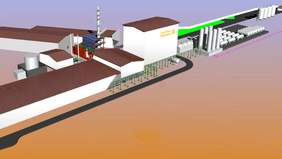The resin industry has a strong interest in replacing petrochemically produced phenol with renewable raw materials. Therefore, within the VIOBOND project the world’s first industrial-scale production plant in which renewable lignin partially replaces fossil-based phenol and formaldehyde will be built. The project was selected for funding as part of the HORIZON Europe program for research and innovation and focuses on the entire value chain.
In the future, it will be possible to produce bio-based, environmentally friendly and less toxic materials for the manufacture of furniture, floor covering, thermal insulation, abrasive paper and other products for everyday use.
Together for more sustainability
9 partners from 5 countries of the European Union form the cross-industry consortium ‘VIOBOND’. The total costs amount to EUR 35 million. Latvijas Finieris Group as project coordinator appointed Pörner Ingenieurgesellschaft in Grimma, Germany as engineering partner for the entire plant including modification of the tank farm and all off-sites. In addition, Pörner will contribute valuable technical know-how and experience in engineering and constructing resin plants and will be responsible for the design of main equipment, required utilities and technical solutions for storing and feeding lignin into the process.
With the pooled expertise and experience of all partners, the project will start on September 1st this year and is scheduled to be completed at the end of August 2026.
For more information, read VIOBOND’s press release:
https://www.finieris.com/en/company/news/news/the-viobond-consortium-will-replace-fossil-resources-with-renewable-lignin-in-everyday-consumer-products
Additional information:
Most plants, including trees of all kinds, contain 20-30% lignin, a natural biopolymer that, together with cellulose and hemicellulose, forms the wood cell structure and creates a tight bond between them. This durable structure allows trees to grow in length while wood retains its excellent mechanical properties. Lignin is the second most common natural raw material on earth.
In the past, lignin was a by-product in the production of cellulose, which, together with other by-products, was mainly used as fuel for energy production. In recent years, the development of novel wood processing technologies has made it possible to extract chemically unmodified lignin from wood that is well suited for further chemical modification and adaptation.
There are numerous potential high-value applications for LPF resin, such as plywood resin, an adhesive for plywood panels and abrasive paper, coating film binders and insulation binders, all of which will be demonstrated in the VIOBOND project.









